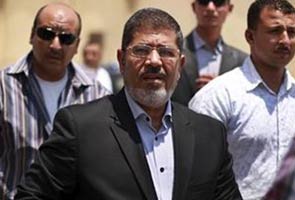
Dubai: Egypt's Islamist President-elect Mohammed Morsi has said he wants to restore long-severed ties with Tehran to create a strategic "balance" in the region, in an interview published on Monday with Iran's Fars news agency.
Morsi's comments may unsettle Western powers as they seek to isolate Iran over its disputed nuclear programme, which they suspect it is using to build atomic bombs. Tehran denies this.
Diplomatic relations between Egypt and Iran were severed more than 30 years ago, but both countries have signalled a shift in policy since former president Hosni Mubarak was toppled last year in a popular uprising.
"We must restore normal relations with Iran based on shared interests, and expand areas of political coordination and economic cooperation because this will create a balance of pressure in the region," Morsi was quoted as saying in a transcript of the interview.
Rivalry between Sunni Muslim Saudi Arabia and Shi'ite giant Iran has been intensified by "Arab Spring" revolts, which have redrawn the political map of the Middle East and left the powerful Gulf neighbours vying for influence.
Fars said it had spoken to Morsi a few hours before the result of the vote was announced on Sunday.
Asked to comment on reports that, if elected, his first state visit would be to Riyadh, Morsi said, "I didn't say such a thing and until now my first international visits following my victory in the elections have not been determined".
Iran subsequently hailed Morsi's victory over former general Ahmed Shafik in Egypt's first free presidential election as a "splendid vision of democracy" that marked the country's final phase of an "Islamic Awakening".
The West, Gulf states and Israel reacted with caution to the result, welcoming the democratic process that led to Morsi's election, but stressing that Egypt's stability was their main priority.
In contrast to comments he made in a televised address after his victory was announced on Sunday, Fars news quoted Morsi as saying Egypt's Camp David peace accord with Israel "will be reviewed", without elaborating.
The peace treaty remains a lynchpin of US Middle East policy and, despite its unpopularity with many Egyptians, was staunchly upheld by Mubarak, who also suppressed the Muslim Brotherhood movement to which Morsi belongs.
The Sunni Brotherhood, whose Palestinian offshoot Hamas rules the Gaza Strip, is vehemently critical ofIsrael, which has watched the rise of Islamists and ongoing political upheaval in neighbouring Egypt with growing concern.
Egypt's formal recognition of Israel and Iran's 1979 Islamic Revolution led to the breakdown of diplomatic relations in 1980. The two countries - among the biggest and most influential in the Middle East - still have reciprocal interest sections, but not at ambassadorial level.
Egypt's foreign minister said last year that Cairo was ready to re-establish diplomatic relations with Iran, which has hailed most Arab Spring uprisings as anti-Western rebellions inspired by its own Islamic Revolution.
Yet Iran has steadfastly supported Syrian President Bashar al-Assad, Tehran's closest Arab ally, who is grappling with a revolt against his rule, and at home has continued to reject demands for reform, which spilled onto the street following the disputed re-election of President Mahmoud Ahmadinejad in 2009.
Morsi's comments may unsettle Western powers as they seek to isolate Iran over its disputed nuclear programme, which they suspect it is using to build atomic bombs. Tehran denies this.
Diplomatic relations between Egypt and Iran were severed more than 30 years ago, but both countries have signalled a shift in policy since former president Hosni Mubarak was toppled last year in a popular uprising.
Rivalry between Sunni Muslim Saudi Arabia and Shi'ite giant Iran has been intensified by "Arab Spring" revolts, which have redrawn the political map of the Middle East and left the powerful Gulf neighbours vying for influence.
Fars said it had spoken to Morsi a few hours before the result of the vote was announced on Sunday.
Asked to comment on reports that, if elected, his first state visit would be to Riyadh, Morsi said, "I didn't say such a thing and until now my first international visits following my victory in the elections have not been determined".
Iran subsequently hailed Morsi's victory over former general Ahmed Shafik in Egypt's first free presidential election as a "splendid vision of democracy" that marked the country's final phase of an "Islamic Awakening".
The West, Gulf states and Israel reacted with caution to the result, welcoming the democratic process that led to Morsi's election, but stressing that Egypt's stability was their main priority.
In contrast to comments he made in a televised address after his victory was announced on Sunday, Fars news quoted Morsi as saying Egypt's Camp David peace accord with Israel "will be reviewed", without elaborating.
The peace treaty remains a lynchpin of US Middle East policy and, despite its unpopularity with many Egyptians, was staunchly upheld by Mubarak, who also suppressed the Muslim Brotherhood movement to which Morsi belongs.
The Sunni Brotherhood, whose Palestinian offshoot Hamas rules the Gaza Strip, is vehemently critical ofIsrael, which has watched the rise of Islamists and ongoing political upheaval in neighbouring Egypt with growing concern.
Egypt's formal recognition of Israel and Iran's 1979 Islamic Revolution led to the breakdown of diplomatic relations in 1980. The two countries - among the biggest and most influential in the Middle East - still have reciprocal interest sections, but not at ambassadorial level.
Egypt's foreign minister said last year that Cairo was ready to re-establish diplomatic relations with Iran, which has hailed most Arab Spring uprisings as anti-Western rebellions inspired by its own Islamic Revolution.
Yet Iran has steadfastly supported Syrian President Bashar al-Assad, Tehran's closest Arab ally, who is grappling with a revolt against his rule, and at home has continued to reject demands for reform, which spilled onto the street following the disputed re-election of President Mahmoud Ahmadinejad in 2009.
© Thomson Reuters 2012


No comments:
Post a Comment